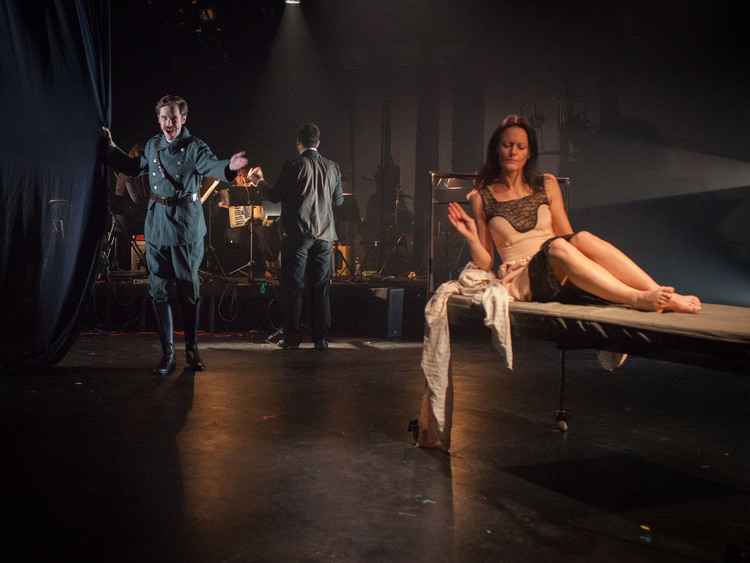Prototype opens with absorbing, finely crafted “Mata Hari”

Jeffrey Gavett and Tina Mitchell in Matt Marks’ “Mata Hari” at Prototype. Photo: Benjamin Heller
Prototype, one of the foremost presenters of new opera and music theater works, is back for it’s fifth annual festival. For Thursday night’s opener at HERE, pride of place went to the world premiere of Mata Hari, from composer Matt Marks and librettist Paul Peers.
By name and reputation alone—dancer, courtesan, spy—Mata Hari would seem a terrific opera subject. But the details of her biography, and the convolutions of her apparent role as a double-agent during the war, present a substantial challenge to any compact narrative.
Still, opera, at its best, is a form that can dispatch narrative and dramatic complications with a single melody or modulation, and Mata Hari is full of intelligent dramatic thinking and fine musical craft.
Rather than straight narrative or melodrama, Mata Hari circles about the main character as her execution for espionage approaches. The opera’s present takes place with her life in a prison cell, and the scenes go back and forth between that and key moments from her past. Mata Hari is a portrait of the woman, and the operatic landscape behind her is her deeds and her fate.
For Mata Hari, the past meant the men in her life–her husband, her lovers, and officers of various nations’ armies. In Peers’ direction, these men encircle her at the prelude, then surround her in her final moments. In between, the appear and return in stages, each filling in a portion of the overall dramatic picture.
The lead role is non-singing, and was played by actress Tina Mitchell. She made the character’s contradictions real and human; sincere and cynical, self-possessed and craven, manipulator and manipulated. Much of her dialogue was set over music, and Mitchell delivered the lines with a shape that was somewhat more than speech and somewhat less than singing.
She had good material to work with. Peers is a first-time librettist, and he impressed in both how he distilled Hari’s life into a coherent, impressionistic narrative, and how his sung lines were crafted to serve the special demands of music—everything was singable.
When not singing, the men did not have Mitchell’s level of stage presence and command. But they came alive with the music, starting with bass Steve Hrycelak as her husband Rudolf MacLeod (he later doubles as Colonel Denvignes, a diplomat who wants to use her as an agent). As men who wanted to use her and be used, at least sexually, by her, Hrycelak, and baritones Joshua Jeremiah (German Colonel Von Kalle) and Daniel Neer (French Captain Ladoux), sang with a leering fervor, expressing an intense desire to uncover both her real feelings and her subterfuge.
The men get the best music, and not just because Mata Hari is a speaking role. There is a smaller, but important part for a women, Sister Léonide, sung by soprano Mary Mackenzie. Léonide tends to Hari in prison, is her interlocutor, and at times sings in Hari’s stead.
In the program, Marks writes that “Mata Hari “might be my first serious opera-theater piece … 20% in terms of scope and 80% in tone.” That tone is mostly ideal, a serious and evocative ambiguity about personal secrets and relationships. But with Léonide, the tone is ambivalent, moving back and forth between drama and a far lighter quality, often within the same phrase. This somewhat disoriented the listener from the core purpose of the opera.
The men always brought things back around. For Hari’s great love, Vadime, the music was tremendous. Sung by tenor Tomás Cruz with a gorgeous, mellifluous, pure tone, the role was deeply affecting, and by association the character enriched Hari’s. The beauty of Vadime’s feelings, felt through the music, honored the depths of his lover.
Through Hari’s interrogation by Captain Bouchardon (baritone Jeffrey Gavett, typically fine and vivid), and her past moments with the others, Marks and Peers managed to show her as a double-agent motivated both by a need to survive as a neutral, Dutch citizen in wartime Europe, both eager perpetrator and victim.
Near the end, at what was clearly designed to be the emotional climax of the opera, the libretto and score veered into sentimentality. This was an obvious choice, but the strength of the opera up to that point was that it had been anything but obvious. The libretto grew fussy and the music bogged down. The purpose of the opera, which had been so clear, become a puzzle; are we to feel sorry for Hari? Is she an unreliable narrator, or a proto-feminist martyr?
The brief finale dropped the sentimentality and restored weight and purpose. Mata Hari’s seriousness and depth, the effect of the iron fist in the velvet glove, punched through at the end.
Mata Hari continues through January 14. The Prototype Festival continues through January 15. prototypefestival.org


